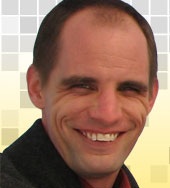Michael Wesch: It's a 'Pull, Pull' World
- By John K. Waters
- 10/12/11

Michael Wesch |
Educators play a critical role in the development of the essential skills students need to navigate the blizzard of unfiltered information available to them via the Web. Michael Wesch, associate professor of cultural anthropology at Kansas State University, said he believes they should also be fostering something more basic: curiosity and imagination.
"The new media landscape is a 'pull' environment," Wesch said. "Nothing is pushed to you from the Web, which makes it essential that we inspire students to seek out the knowledge that's out there. The content isn't fundamentally different, but the environment just demands more curiosity and imagination."
Wesch, a cultural anthropologist and researcher in the modern discipline of digital ethnography, will expand on this idea during his keynote presentation at FETC 2012, the annual education technology conference, held this year at the Orange County Convention Center in Orlando, FL, Jan. 23 to 26. This will be Wesch's first appearance at FETC.
Wesch is a well known thought leader who burst into the public consciousness in 2007 when a video he created to launch Kansas State's Digital Ethnography Working Group became a YouTube sensation. "The Machine is Us/ing Us" was released to the video publishing site Jan. 31 of that year. Within a month, the little video created in Wesch's basement in St. George, KS, had been seen by more than 1.7 million people, translated into five languages, and shown to large audiences at major conferences on six continents. To date, the video has been viewed more than 11 million times in its original form and translated into more than 10 languages.
Wesch is best known as a researcher, but he's also an active developer of innovative teaching techniques, including the semester-long World Simulation project, which is the centerpiece of Kansas State's Introduction to Cultural Anthropology course. On his Mediated Cultures Web site, Wesch described the project as "a radical experiment in learning, created in a fit of frustration with the large lecture hall format which seems inevitable in a classroom of 200 to 400 students."
Before turning his attention to the effects of social media and digital technology on global culture, Wesch spent two years studying the implications of writing on a remote indigenous culture in the rain forest of Papua New Guinea. Wesch found himself for the first time in a culture that was not mediated. He has described how "new media" in the form of printed census books changed the village dramatically.
"We have to recognize in our society that the new media we see in our environment are not just new means of communication, not just tools," he told attendees at the Campus Technology 2011 conference in July. "Media change what can be said, how it can be said, who can say it, who can hear it, and what messages will count as information and knowledge."
Wesch compared the need to "re-inspire curiosity and imagination" in students with bridging the digital divide.
"We've talked for years about the digital divide and how, if you're on the wrong side of that technology access gap, you get left behind," he said. "I think there's the potential now for a kind of curiosity gap. Consider how much further ahead a curious student will be, compared with a student who lacks curiosity, in an environment in which he or she can reach out and grab new knowledge anytime, anywhere on all kinds of devices. If you're a curious person, you'll learn and grow; if you're not, you could just drift along while others race ahead."
Wesch is also likely to talk with FETC attendees about teaching students to become "knowledge-able," his term for the ability to find, sort, analyze, criticize, and ultimately create new information and knowledge.
"It's just not enough anymore to know a bunch of stuff," he said.
Being knowledge-able, he added, is also about recognizing that, while we're using these tools, the tools might be changing us.
"I think of all this in terms of a shift in focus away from the idea that we need to stuff students' heads with information," he said. "Instead, we should be concentrating on making them truly knowledge-able. Imagination and curiosity are the heart of that idea; if we have those qualities, learning becomes joyous."
About the Author
John K. Waters is a freelance journalist and author based in Mountain View, CA.